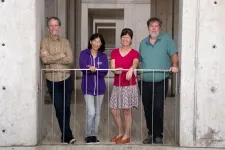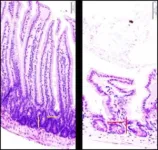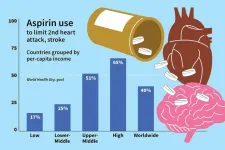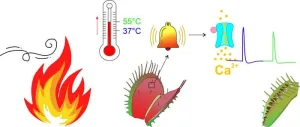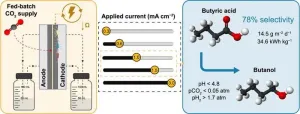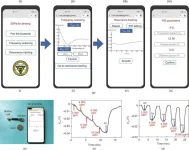(Press-News.org) LA JOLLA (August 22, 2023)—The prevalence of colorectal cancer in people under the age of 50 has risen in recent decades. One suspected reason: the increasing rate of obesity and high-fat diets. Now, researchers at the Salk Institute and UC San Diego have discovered how high-fat diets can change gut bacteria and alter digestive molecules called bile acids that are modified by those bacteria, predisposing mice to colorectal cancer.
In the study, published in Cell Reports on August 22, 2023, the team found increased levels of specific gut bacteria in mice fed high-fat diets. Those gut bacteria, they showed, alter the composition of the bile acid pool in ways that cause inflammation and affect how quickly intestinal stem cells replenish. Bile acids are molecules produced by the liver and used by the gut to help digest food and absorb cholesterol, fats, and nutrients.
“The balance of microbes in the gut is shaped by diet, and we are discovering how alterations in the gut microbial population (the gut microbiome) can create problems that lead to cancer,” says co-senior author and Professor Ronald Evans, director of Salk’s Gene Expression Laboratory. “This paves the way toward interventions that decrease cancer risk.”
In 2019, Evans and his colleagues showed in mice how high-fat diets boosted the overall bile acid levels. The shift in bile acids, they found, shut down a key protein in the gut—called the Farnesoid X receptor (FXR)—and increased the prevalence of cancer.
However, there were still missing links in the story, including how the gut microbiome and bile acids are changed by high-fat diets.
In the new work, Evans’ group teamed up with the labs of Rob Knight and Pieter Dorrestein at UC San Diego to examine the microbiomes and metabolomes—collections of dietary and microbially derived small molecules—in the digestive tracks of animals on high-fat diets. They studied mice with a genetic mutation that makes them more susceptible to colorectal tumors.
The scientists discovered that although mice fed high-fat diets had more bile acids in their guts, it was a less diverse collection with a higher prevalence of certain bile acids that had been changed by gut bacteria. They also showed that these modified bile acids affected the proliferation of stem cells in the intestines. When these cells don’t replenish frequently, they can accumulate mutations—a key step toward encouraging the growth of cancers, which often arise from these stem cells.
“We are only just beginning to understand these bacterially-conjugated bile acids and their roles in health and disease,” says co-author Michael Downes, a staff scientist at Salk.
There were also striking differences in the microbiomes of the mice on high-fat diets: the collections of gut bacteria in these mice’s digestive tracts were less diverse and contained different bacteria than the microbiomes of mice not on high-fat diets. Two of these bacteria—Ileibacterium valens and Ruminococcus gnavus—were able to produce these modified bile acids.
The scientists were surprised to discover that a high-fat diet actually had a greater impact on the microbiome and modified bile acids than a genetic mutation that increases cancer susceptibility in the animals.
“We’ve pinpointed how high-fat diet influences the gut microbiome and reshapes the bile acids pool, pushing the gut into an inflamed, disease-associated state,” says co-first author Ting Fu, a former postdoctoral fellow in the Evans lab.
The researchers believe high-fat diets change the composition of the microbiome, encouraging the growth of bacteria like I. valens and R. gnavus. In turn, that boosts levels of modified bile acids. In a vicious cycle, those bile acids create a more inflammatory environment that can further change the makeup of gut bacteria.
“We’ve deconstructed why high-fat diets aren’t good for you, and identified specific strains of microbes that flare with high-fat diets,” says Evans, March of Dimes Chair in Molecular and Developmental Biology. “By knowing what the problem is, we have a much better idea of how to prevent and reverse it.”
In the future, the team will study how quickly the microbiome and bile acids change after an animal begins eating a high-fat diet. They also plan to study ways to reverse the cancer-associated effects of a high-fat diet by targeting FXR—the protein that they previously discovered to be associated with bile acid changes.
Other authors of the paper are Tae Gyu Oh, Justin L McCarville, Fritz Cayabyab, Mingxiao He, Ruth T. Yu, Annette Atkins, and Janelle Ayres of Salk; Gibraan Rahman, Hui Zhi, Zhenjiang Xu, Anupriya Tripathi, Cameron Martino, Qiyun Zhu, Fernando Vargas, and Manuela Raffatellu of UC San Diego; Tao Huan, Jian Guo, Brian Low, and Shipei Xing of University of British Columbia; and Sally Coulter and Christopher Liddle of University of Sydney.
The work was supported by grants from the National Cancer Institute (CA014195), the National Institutes of Health (CA265762-01, DP1 AT010885, AI126277, AI145325, AI154644, AI114625, P01HL147835, R01DK057978), the collaborative microbial metabolite center (1U24DK133658-54701), a UC San Diego Postdoc Microbiome Center Seed Pilot Grant, a Hewitt Medical Foundation Fellowship, a Salk Alumni Fellowship, a Crohn's & Colitis Foundation (CCFA) Visiting IBD Research Fellowship, the Lustgarten Foundation (122215393-02), the NOMIS Foundation, a SWCRF Investigator Award, the David C. Copley Foundation, the Wasily Family Foundation, the Don and Lorraine Freeberg Foundation, and the Burroughs Wellcome Fund.
About the Salk Institute for Biological Studies:
Unlocking the secrets of life itself is the driving force behind the Salk Institute. Our team of world-class, award-winning scientists pushes the boundaries of knowledge in areas such as neuroscience, cancer research, aging, immunobiology, plant biology, computational biology, and more. Founded by Jonas Salk, developer of the first safe and effective polio vaccine, the Institute is an independent, nonprofit research organization and architectural landmark: small by choice, intimate by nature, and fearless in the face of any challenge. Learn more at www.salk.edu.
END
High-fat diets alter gut bacteria, boosting colorectal cancer risk in mice
Salk scientists pinpointed specific microbes and bile acids that become more prevalent in the guts of mice fed high-fat diets
2023-08-22
ELSE PRESS RELEASES FROM THIS DATE:
BU commentary: Vitamin D supplementation was found to improve more than 1.5 fold survival of cancers of the digestive tract including colorectal cancer in patients with a cancer fighting immune system
2023-08-22
(Boston)—For more than 100 years, it has been believed that sunlight and vitamin D deficiency were associated with the risk for many deadly cancers including colorectal, prostate and breast. But some scientists remained skeptical that this nutrient provides any benefit for reducing cancer risk and morbidity and mortality and several randomized controlled trials that have supported this doubt.
However, in a new commentary in JAMA Network Open, Michael F. Holick, PhD, MD, professor of medicine, pharmacology, physiology & biophysics and molecular medicine at Boston University Chobanian & Avedisian School of Medicine, explores the controversy as to ...
Aspirin can help prevent a second heart attack, but most don’t take it
2023-08-22
For people who have experienced a heart attack or stroke, taking a daily aspirin has been shown to help prevent a second one. Yet, despite aspirin’s low cost and its clear benefits in such scenarios, fewer than half of people worldwide who have had a heart attack or stroke take the medication, according to a new study led by researchers at Washington University School of Medicine in St. Louis and the University of Michigan.
The study appears Aug. 22 in JAMA.
Cardiovascular disease, including heart attack and ...
Poor report card for children’s wellbeing
2023-08-22
While COVID-19 lockdowns are no longer mandated, the stress and anxiety of the pandemic still lingers, especially among young South Australians, say health experts at the University of South Australia.
In a new study released today, researchers show that children’s mental health and wellbeing have gradually worsened over the past six years, particular during and post the pandemic.
Examining measures of wellbeing – life satisfaction, optimism, happiness, cognitive engagement, emotional regulation, perseverance, worry, and sadness – ...
Heat sensor protects the Venus flytrap from fire
2023-08-22
The Venus flytrap can survive in the nutrient-poor swamps of North and South Carolina because it compensates for the lack of nitrogen, phosphate and minerals by catching and eating small animals. It hunts with snap traps that have sensory hairs on them. If an insect touches these hairs two times, the traps shut and digests the prey.
In its location in the swamp, the carnivorous plant is often not visible because it is overgrown by grass. In summer, the grass dries up. Then it can catch fire from the frequent lightning storms typical of North Carolina – ...
Cleveland Clinic-led team awarded $2.8 million to translate cancer cell evolution research to clinical care
2023-08-22
The National Institutes of Health recently awarded Cleveland Clinic’s Jacob Scott, M.D., D.Phil., and collaborators $2.8 million to translate research on how cancer cells evolve and compete into patient care. The project aims to move previous advances done in vitro closer to clinical reality by developing computer and preclinical models side-by-side, a significant step in the fight against multidrug-resistant cancers that are responsible for more than 90% of cancer deaths.
This is a milestone for ...
Digital real estate listings with more photos, descriptions earn higher sale prices
2023-08-22
AMES, IA — Buying a home is a time-consuming process, in part because it requires balancing financial realities with a long checklist of expectations and desires. People care about a solid foundation and certain number of bedrooms. But a property’s curb appeal, neighbors and proximity to work or good schools also matter.
For most house-hunters in the U.S., setting up filters and scrolling listings on Zillow has become a crucial first step.
“Digital real estate platforms like Zillow help people see what’s available, ...
Can sound waves help people quit cocaine? Cutting-edge clinical trial focuses in
2023-08-22
Pioneering researchers at UVA Health are testing whether focused sound waves can help people overcome cocaine addiction, a growing problem across the nation.
The scientists have launched a clinical trial, believed to be the first of its kind in the world, to test whether low-intensity focused ultrasound can help reprogram brain cells to reduce the desire for cocaine. The noninvasive approach focuses sound waves on a portion of the brain called the insula, thought to play a critical role in multiple forms of addiction. If the trial is successful, it could pave the way for an important new tool to treat addiction in general.
“This ...
Innovative breakthrough in sustainable chemical production
2023-08-22
Carbon capture and utilization (CCU) technologies are crucial for addressing climate change while ensuring economic viability. MES has emerged as a promising approach for CO2 reduction to biofuels and platform chemicals. However, the industrial adoption of MES has been hindered by low-value products like acetate or methane and high electric power demand.
In a new study recently published on 26 July 2023, in the journal Environmental Science and Ecotechnology, researchers from University of Girona conducted a study that focused on electrically ...
Detroit Public Schools Community District staff complete CPR training and education
2023-08-22
DETROIT, August 22, 2023 — Today, Detroit Public Schools Community District teachers and coaches completed either the American Heart Association’s Heartsaver® CPR AED (automated external defibrillator) course, which provides the highest quality evidence-based training in the lifesaving skills of CPR, as well as the appropriate use of an AED, or Hands-Only CPR education. Adding lifesavers to the chain of survival in the Detroit community through CPR training and education is a priority for the Detroit Lions Foundation.
“We are honored to use our platform to further bring awareness and education to our community ...
Groundbreaking Ultracompact Spoof Surface Plasmon Sensing System Revolutionizes Gas Detection with Smartphone Integration
2023-08-22
A team of researchers from Southeast University of China has developed a cutting-edge ultracompact sensing system that leverages the power of spoof surface plasmon resonance (SSPR) technology to enable adaptive and accurate gas detection using a smartphone. The research article detailing this breakthrough, titled "An Ultracompact Spoof Surface Plasmon Sensing System for Adaptive and Accurate Detection of Gas Using a Smartphone," has been published in the prestigious journal Engineering.
Traditional dielectric sensing methods often suffer from signal fluctuations, resulting in reduced sensitivity and accuracy. In response to the growing demand for precise gas detection in ...
LAST 30 PRESS RELEASES:
Novel camel antimicrobial peptides show promise against drug-resistant bacteria
Scientists discover why we know when to stop scratching an itch
A hidden reason inner ear cells die – and what it means for preventing hearing loss
Researchers discover how tuberculosis bacteria use a “stealth” mechanism to evade the immune system
New microscopy technique lets scientists see cells in unprecedented detail and color
Sometimes less is more: Scientists rethink how to pack medicine into tiny delivery capsules
Scientists build low-cost microscope to study living cells in zero gravity
The Biophysical Journal names Denis V. Titov the 2025 Paper of the Year-Early Career Investigator awardee
Scientists show how your body senses cold—and why menthol feels cool
Scientists deliver new molecule for getting DNA into cells
Study reveals insights about brain regions linked to OCD, informing potential treatments
Does ocean saltiness influence El Niño?
2026 Young Investigators: ONR celebrates new talent tackling warfighter challenges
Genetics help explain who gets the ‘telltale tingle’ from music, art and literature
Many Americans misunderstand medical aid in dying laws
Researchers publish landmark infectious disease study in ‘Science’
New NSF award supports innovative role-playing game approach to strengthening research security in academia
Kumar named to ACMA Emerging Leaders Program for 2026
AI language models could transform aquatic environmental risk assessment
New isotope tools reveal hidden pathways reshaping the global nitrogen cycle
Study reveals how antibiotic structure controls removal from water using biochar
Why chronic pain lasts longer in women: Immune cells offer clues
Toxic exposure creates epigenetic disease risk over 20 generations
More time spent on social media linked to steroid use intentions among boys and men
New study suggests a “kick it while it’s down” approach to cancer treatment could improve cure rates
Milken Institute, Ann Theodore Foundation launch new grant to support clinical trial for potential sarcoidosis treatment
New strategies boost effectiveness of CAR-NK therapy against cancer
Study: Adolescent cannabis use linked to doubling risk of psychotic and bipolar disorders
Invisible harms: drug-related deaths spike after hurricanes and tropical storms
Adolescent cannabis use and risk of psychotic, bipolar, depressive, and anxiety disorders
[Press-News.org] High-fat diets alter gut bacteria, boosting colorectal cancer risk in miceSalk scientists pinpointed specific microbes and bile acids that become more prevalent in the guts of mice fed high-fat diets
